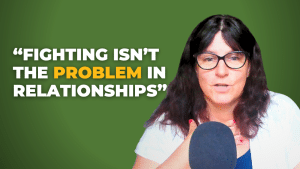
Why Conflict is Key to a Healthy Relationship
If you’re like many people, you might feel that avoiding conflict is the secret to maintaining peace in a relationship. You might think, “If we don’t fight, things are fine.” I hear this from clients all the time, especially when one partner tells me, “We never fight. He shuts down, or she walks away, and we just never have a conflict.”
What I’ve learned through my work is that avoiding conflict doesn’t mean everything is fine. Often, one partner grew up in a home where conflict was either invisible or destructive. Maybe they never saw their parents argue at all, or perhaps they witnessed explosive, unhealthy fighting. As a result, they’ve come to believe that avoiding conflict is the path to a good relationship.
But here’s the thing: conflict, when handled well, is essential for growth. In healthy relationships, conflict is a way to evolve together, to navigate disagreements in a way that strengthens the connection. It’s not about yelling, name-calling, or making each other feel bad. That’s not conflict—that’s fighting. And there’s a huge difference between the two.
Understanding Conflict vs. Fighting
One of the biggest lessons I try to impart to my clients is that fighting is what we want to avoid, not conflict. Fighting is what happens when we lash out at each other—whether through harsh words, yelling, or, in worst cases, physical altercations. Nobody enjoys that, and it certainly doesn’t lead to growth.
But conflict is different. It’s a natural, and frankly, necessary part of any relationship. It’s how we face differences and challenges head-on, not to tear each other down, but to figure out how to move forward together. When handled productively, conflict becomes an opportunity for both partners to evolve individually and as a couple.
The problem is that so many of us associate conflict with discomfort. We don’t want to have those difficult conversations because they make us feel vulnerable or uneasy. So, we avoid them. But in doing so, we miss out on the chance to grow and to really connect with our partner on a deeper level.
The ‘Four Horsemen’ of Relationship Conflict
When it comes to conflicts in relationships, there are four major roadblocks that often get in the way of productive discussions. John and Julie Gottman, experts in relationship dynamics, call them the “Four Horsemen of the Marriage Apocalypse.” These are:
- Criticism: This can show up as small digs, sarcastic remarks, or outright attacks on your partner’s character.
- Defensiveness: When we immediately respond to our partner’s concerns with excuses or counter-attacks, rather than taking responsibility.
- Contempt: This is the most harmful, often showing up as belittling or dismissing your partner’s feelings.
- Stonewalling: This is when one partner shuts down entirely, refusing to engage in the conversation.
If any of these four behaviors creep into your conflicts, it’s almost guaranteed that the argument won’t be productive. Trust me, I’ve seen it many times. It turns the conflict into something much more damaging.
But there’s good news! You don’t have to let these behaviors dominate your relationship. The Gottmans also talk about the antidotes to these destructive patterns, such as showing gratitude, taking responsibility, and approaching conflict with curiosity instead of criticism.
Shifting Our Perspective on Conflict
So, what can we do to change the way we handle conflict? First, it’s important to recognize that conflict isn’t the enemy. Avoiding it won’t help us grow, and it certainly won’t help us solve the deeper issues in our relationships. We need to show up for conflict in a way that fosters understanding and connection.
When we approach conflict with openness and curiosity—asking, “Why does this issue keep coming up?” or “How can we both grow from this?”—we can turn a potentially painful situation into one that strengthens the relationship. We need to move away from the mindset that conflict is a bad thing and recognize it as a natural, necessary part of any healthy relationship.
If you feel like you and your partner are constantly fighting over the same things, or worse, avoiding conflict altogether, it might be time to reassess how you approach these situations. Conflict doesn’t have to be destructive. In fact, when approached with the right mindset, it can be one of the most powerful tools for relationship growth.
So, the next time you’re faced with a disagreement, don’t shy away from it. Instead, lean into it with openness and a willingness to grow. Who knows? You might just come out of it with a stronger, more connected relationship.





